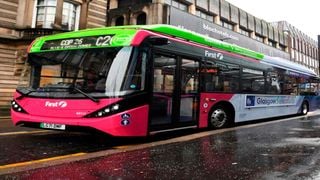
A COP26 electric bus is parked in the city centre of Glasgow, Scotland on October 29, 2021.
| Andy Buchanan | AFPBusiness
Premium
Fully electric bus to shove diesel version off the road
What you need to know:
- According to Opibus Chief Strategy and Marketing Officer, Albin Wilson, the bus will cost Sh11.35 million.
- Opibus said the locally-designed and manufactured bus boasts superior performance compared to diesel buses.
Swedish electric vehicle maker Opibus has introduced the first fully electric bus in Kenya, which it says can be mass-produced by the end of next year.
The development signals rising interest in electrifying public transport in the country at a time fuel cost is rising, piling pressure on public transport operators to lower their expenses.
Opibus Chief Strategy and Marketing Officer Albin Wilson told the Nation that the bus will cost Sh11.35 million ($100,000) and will be made available for sale mid this year.
He said the firm has already received an order for 10 vehicles from an undisclosed client, which will be delivered this year.
“A fully made electric bus will cost $100,000,” Mr Wilson said.
Superior performance
To lower upfront cost of the unit, Mr Wilson said the firm will provide a subscription model that will allow buyers to pay for it over time.
“The subscription model lowers the upfront price so that buyers will be paying for the bus while using it,” he said.
Opibus said the locally-designed and manufactured bus boasts superior performance compared to diesel buses, and is cheaper than imported fully-built electric buses.
The e-mobility firm said the electric bus will save 80 per cent in maintenance costs and a 50 per cent in total expenses by eliminating use of fuel whose prices have been steadily rising.
The first electric bus will be launched commercially mid this year.
Diesel-run buses
“Following this, the platform will be tested at scale in commercial deployment of 10 buses during the second half of 2022,” Public Transport Project Coordinator Dennis Wakaba said.
“In doing so, we ensure that we gather valuable feedback to continue the development of the product for an optimised market fit. It feels great to be the first movers in this very exciting space,” Mr Wakaba said.
The buses will be initially deployed in Nairobi and its environs where charging points will be installed. They’ll will be fully charged within an hour, he said.
Opibus is also converting diesel-run buses into electric ones for $45,000 (Sh5.1 million).
This comes months after another electric vehicle firm, BasiGo, last year raised Sh100 million in seed funding to locally assemble electric 25 and 36-seater buses for public transport.





